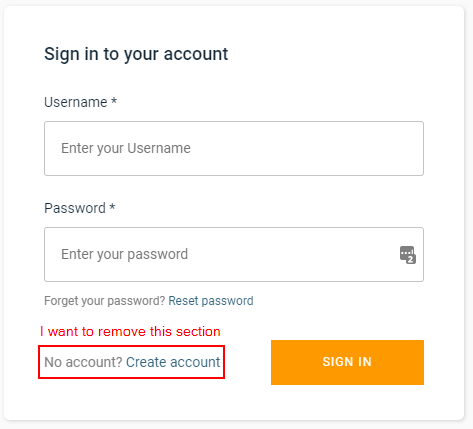Как отключить ссылку для подписки на аутентификатор aws ampify vue?
Я использую amplify-authenticator компонент из aws-amplify-vueбиблиотека, чтобы включить аутентификацию для моего приложения. Я пытаюсь понять, как отключить ссылку "Создать учетную запись" в интерфейсе пользователя, и мне кажется, что я ничего не могу найти в документации или в Интернете. Я видел несколько мест, где пользователи отключили его, скрыв с помощью css, и несколько мест, где пользователи могли отключить его с помощью библиотеки реакции, но я не нашел ничего особенного для библиотеки vue. Возможно, мне просто не хватает документации, но знает ли кто-нибудь, как удалить функцию регистрации из аутентификатора vue Amplify?
Составная часть
<template>
<v-container>
<amplify-authenticator></amplify-authenticator>
</v-container>
</template>
<script lang="ts">
import { Vue, Component } from "vue-property-decorator";
import { Auth } from "aws-amplify";
import logger from "../logging";
import { components } from "aws-amplify-vue";
import { AmplifyEventBus } from "aws-amplify-vue";
@Component({
components: {
...components
}
})
export default class Login extends Vue {
async created() {
try {
// This function throws an error if no user is logged in
await Auth.currentAuthenticatedUser({ bypassCache: true });
this.$router.push("/instruments");
} catch (e) {
logger.silly("No user currently logged in");
AmplifyEventBus.$on("authState", async info => {
logger.silly("signedIn");
logger.silly(info);
if (info === "signedIn") {
const user = await Auth.currentAuthenticatedUser({
bypassCache: true
});
this.$router.push("/instruments");
} else {
logger.error(`Failed to login`);
alert("Failed to login");
}
});
}
}
}
</script>
<style scoped></style>
Обновление 1
Основываясь на ответе @asimpledevice, я безуспешно пробовал следующее:
<template>
<v-container class="d-flex justify-center align-center">
<amplify-authenticator
:authConfig="authConfiguration"
></amplify-authenticator>
</v-container>
</template>
<script lang="ts">
import { Vue, Component } from "vue-property-decorator";
import { Auth } from "aws-amplify";
import StoreTypes from "../store-types";
import logger from "../logging";
import { components } from "aws-amplify-vue";
import { AmplifyEventBus } from "aws-amplify-vue";
@Component({
components: {
...components
}
})
export default class Login extends Vue {
async mounted() {
try {
// This function throws an error if no user is logged in
await Auth.currentAuthenticatedUser({ bypassCache: true });
this.$router.push("/instruments");
} catch (e) {
const self = this;
AmplifyEventBus.$on("authState", async info => {
if (info === "signedIn") {
this.$store.dispatch(StoreTypes.types.LOAD_CURRENT_USER);
const nextLocation =
self.$route.query.redirect !== null &&
self.$route.query.redirect !== undefined
? (self.$route.query.redirect as string)
: "/instruments";
this.$router.push(nextLocation).catch(err => {});
}
});
}
}
authConfiguration() {
return {
signInConfig: {
isSignUpDisplayed: false
}
};
}
}
</script>
6 ответов
Вы можете скрыть раздел "зарегистрироваться" с помощью объекта "signInConfig".
configurationOptions: any = {
signInConfig: {
isSignUpDisplayed: false
}
};
Затем вы можете передать этот объект как опору компоненту:
<amplify-authenticator
:authConfig="configurationOptions"
></amplify-authenticator>
ПРИМЕЧАНИЕ. Вы должны сделать объект конфигурации локальным свойством. Конфигурация не будет работать, если это функция или вычисляемое свойство. Ваше полное решение будет следующим:
<template>
<v-container class="d-flex justify-center align-center">
<amplify-authenticator
:authConfig="configurationOptions"
></amplify-authenticator>
</v-container>
</template>
<script lang="ts">
import { Vue, Component } from "vue-property-decorator";
import { Auth } from "aws-amplify";
import StoreTypes from "../store-types";
import logger from "../logging";
import { components } from "aws-amplify-vue";
import { AmplifyEventBus } from "aws-amplify-vue";
@Component({
components: {
...components
}
})
export default class Login extends Vue {
configurationOptions: any = {
signInConfig: {
isSignUpDisplayed: false
}
};
async mounted() {
try {
// This function throws an error if no user is logged in
await Auth.currentAuthenticatedUser({ bypassCache: true });
this.$router.push("/instruments");
} catch (e) {
const self = this;
AmplifyEventBus.$on("authState", async info => {
if (info === "signedIn") {
this.$store.dispatch(StoreTypes.types.LOAD_CURRENT_USER);
const nextLocation =
self.$route.query.redirect !== null &&
self.$route.query.redirect !== undefined
? (self.$route.query.redirect as string)
: "/instruments";
this.$router.push(nextLocation).catch(err => {});
}
});
}
}
}
</script>
<style></style>
С участием
@aws-amplify/auth ^3.2.6 и
@aws-amplify/ui-vue ^0.2.20это работает, как описано в документации для входа
<template>
<div>
<amplify-authenticator username-alias="email">
<amplify-sign-in slot="sign-in" :hide-sign-up="true"
username-alias="email">
</amplify-sign-in>
</amplify-authenticator>
</div>
</template>
Если вы используете withAuthenticator:
const withAuthenticatorOptions = {
hideSignUp: true
}
export default withAuthenticator(MyApp, withAuthenticatorOptions);
Я получил это для работы с упрощенным встроенным выражением:
<amplify-authenticator :authConfig="{ signInConfig: { isSignUpDisplayed: false } }" />
Если использоватьAmplify UI for Vue, тогда это так же просто, как привязка:hide-sign-up="true"в аутентификаторе:
<template>
<authenticator :hide-sign-up="true">
<template v-slot="{ user, signOut }">
<h1>Hello {{ user.username }}!</h1>
<button @click="signOut">Sign Out</button>
</template>
</authenticator>
</template>
Я пробовал это, в Angular 8 это работает.
<amplify-authenticator>
<amplify-sign-in slot="sign-in" hide-sign-up="true"></amplify-sign-in>
</amplify-authenticator>
